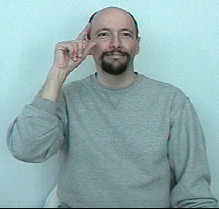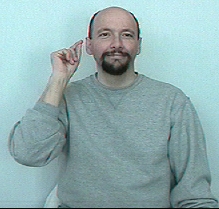Also see: Thomas Hopkins and Edward Minor Gallaudet
Also see the sign for GALLAUDET
Also see: Gallaudet University (2)Also see: Gallaudet University (3)
Gallaudet University:Heather Sheffield
2001
November 12,Gallaudet University
Gallaudet University in Washington D.C. is the only liberal arts college for deaf and hard of hearing students. The University has over a hundred years of history behind it. It is responsible for producing many leaders in the deaf and hard of hearing community. The University has progressed into much more than a place to learn for its students. Although the University has experienced many trials and tribulations it is a respected school and carries great honor in its name.
Gallaudet University is named after Thomas Hopkins Gallaudet, who was born is Philadelphia, Pennsylvania in 1787. Mr. Gallaudet was a brilliant student and entered Yale University at the age of 14. He graduated from Yale first in his class four years later. Having deep Protestant roots, Mr. Gallaudet decided to join the ministry. Reverend Gallaudet meet Dr. Mason Cogswell and his daughter Alice. The child was deaf and Mr. Gallaudet and the girls father were concerned about the child's education. Dr. Cogswell persuaded Mr. Gallaudet to travel to Europe and study their methods of teaching deaf students. He was displeased with his findings therefore he continued his travels to France, where he met Laurent Clerc at the Paris Institute. Gallaudet then convinced Clerc to travel home with him and the two started the first school for the deaf, the American School for the Deaf. Alice was one of the first students and the school still educates today.
The University began when Amos Kendall donated two acres of his land in Washington D.C. for deaf and blind students that were seeking aide. Mr. Kendall became involved with the children and petitioned the court to make them his wards. Kendall received aide from the government and began the Columbia Institute for the Instruction for the Deaf and Dumb. He made Thomas Hopkins Gallaudet's son, Edward Miner Gallaudet, the superintendent of the school. At the turn of the 20th century Gallaudet University briefly shifted to more technical fields of study. However, when Dr. Percival Hall became the second president of Gallaudet University he made the curriculum more liberal. In 1954, by an act of Congress, the Institution's name was changed to Gallaudet College. The 1970's continued as a period of growth for the University. The school was being effected by laws passed by the government that involved disabled individuals. Gallaudet University expanded its program to meet the demands of the new laws.
Perhaps the event that put Gallaudet University on the map and many individuals remember as the civil rights movement for the deaf was the events that started on March 9, 1988. The board of trustees at Gallaudet University announced that the seventh president was going to be a hearing person. Angry with the decision many students, faculty, alumni, and staff shut down the campus. The protests lasted a week until all the demands of the protestors were met. The protestors terms were that a deaf person must be selected as president, Jane Spilman step down as the chairperson of the board of trustees, deaf people must have a 51% majority on the board, and there would be no reprisals against any student and employee involved in the protest. Dr. I. King Jordan was selected the eighth and first deaf president. The incident proves that deaf people can band together effectively for a common cause and succeed.
Gallaudet University plays a crucial role in the lives of deaf and hard of hearing people everywhere. The school has become a safe haven for students with a hearing disability because they learn and grow with other students who are deaf or hard of hearing. Gallaudet may be remembered by the world because of the events of March 9, 1988 but the students that graduate from the University will always know it as their alma mater.
Bibliography
Christiansen, John B. & Barnartt, Sharon N.(1995)Deaf President Now! Washington, D.C.: Gallaudet University Press. 1995.
Gannon, Jack R.(1989) The Week The World Heard Gallaudet Washington D.C.: Gallaudet University Press. 1989
No Author. (1997, Nov. 7) Gallaudet University. Copyright 1996 Retrieved 24, Oct. 2001:
http://pr.gallaudet.edu/VisitorsCenter/GallaudetHistory/index.html
The sign for "GALLAUDET."
Note: The sign "Gallaudet" is similar to the sign for "glasses."
More on Gallaudet University...
Note: photo credit for photograph of Gallaudet University: Ira Meinhofer 2008
The History and Significance of Gallaudet University
11/29/2008
by Kathryn LittleI. King Jordan, a past president of Gallaudet University, once said, "When you talk to people who can hear and you ask them what they think it would be like to be a deaf person, then all of their thinking is ‘Well, I couldn't do this. Can't, can't, can't, can't, can't...' - they would start listing all the things they can't do. And I don't think like that. Deaf people don't think like that. We think about what we can do..." (Through Deaf Eyes, 2007).
This sense of perseverance and accomplishment is the driving force behind the success of Gallaudet University today, and this school has become an icon of achievement for the Deaf community. In order to understand how this school has impacted our society for more than a century, it's necessary to understand the history of this establishment.
The roots of Gallaudet University can be traced back to the eighteenth century, when Thomas Hopkins Gallaudet was born and educated. Gallaudet was a true intellectual prodigy as evidence by his graduation from Yale as the top student in his class -- at the age of seventeen. After completing some years of independent study and a law apprenticeship, Gallaudet prepared to work as a salesman, but rather felt called to serve in the ministry instead. Little did Mr. Gallaudet know that a little girl named Alice Cogswell was about to change his life, along with the future of Deaf education in America...
Nine-year-old Alice was the deaf daughter of Gallaudet's neighbor, Dr. Mason Cogswell. Little Alice became deaf at the age of two, after suffering an attack of spotted fever (Barnard, 1852). Mr. Cogswell was concerned about the quality of education his daughter would receive, and asked Gallaudet to travel to Europe to research methods of educating deaf students. Once there, Gallaudet met the head of "Institut Royal des Sourds-Muets" and two of its deaf faculty, Laurent Clerc and Jean Massieu. Gallaudet studied teaching methodology and sign language at this Institute before convincing Laurent Clerc to return with him to the US and open a school for the deaf. The school they founded, the American School for the Deaf, was the first permanent school for deaf children established in this country. Mr. Gallaudet acted as principal of the school for more than a decade. (Gallaudet University: The Legacy Begins, 2008).
The Gallaudet family contribution to the education of deaf children did not end with Thomas. His son Edward and wife Sophia were to become the superintendent and matron of the Columbia Institution for the Instruction of the Deaf and Dumb and Blind. In 1864, Congress permitted the college to award college degrees to its students and Gallaudet was made president of the college. The first graduation, consisting of three students who had completed the course of study, occurred in 1869 and Gallaudet presided over the ceremony. The diplomas were signed by the president of the United States, Ulysses Grant.
Large scale evolution was in store for the college in the twentieth century. In 1954, the college changed its name to Gallaudet College to honor the contributions of Thomas Gallaudet. In 1970, President Nixon signed a bill that established secondary schools on the Gallaudet campus that were devoted to providing education to younger deaf students through the Laurent Clerc National Deaf Education Center. In 1986, another act of congress on behalf of the college bestowed Gallaudet with university status. In 1988, the Deaf President Now protest united students, faculty, and alumni across the country in support of installing a Deaf person as Gallaudet's next president. Thus, the university's eighth president overall became the first deaf president, and his name was I. King Jordan.
Currently, the course of studies at Gallaudet University provides paths leading to Bachelor's of Arts or Sciences, Master of Sciences, and Doctoral degrees and its alumni are included in the ranks of lawyers, scholars, investment bankers, and others. (Gallaudet University: Gallaudet History, 2008).
References
Barnard, Henry. (1852). Tribute to Gallaudet: A discourse in commemoration of the life, character, and services of the Rev. Thomas H. Gallaudet. Retrieved November 22, 2008, from http://www.saveourdeafschools.org/tribute_to_gallaudet.pdf
Gallaudet History. (2008). Gallaudet University. Retrieved November 22, 2008, from http://www.gallaudet.edu/x228.xml
The Legacy Begins. (2008). Gallaudet University. Retrieved November 22, 2008, from http://www.gallaudet.edu/x229.xml
Through Deaf Eyes. (2007). Public Broadcasting Service. Retrieved November 20, 2008, from http://www.pbs.org/weta/throughdeafeyes/resources/questions.html
Want to help support ASL University? It's easy: DONATE (Thanks!)
(You don't need a PayPal account. Just look for the credit card logos and click continue.)
For a list of various ways to donate see: https://www.Lifeprint.com/donate
Another way to help is to buy something from the ASLU "Bookstore."
Want even more ASL resources? Visit the "ASL Training Center!" (low cost / high quality courses) CHECK IT OUT >
A must see!: ASL University's YouTube playlist ►
You can learn
American Sign Language (ASL) online at American Sign Language University ™
ASL resources by Lifeprint.com © Dr. William Vicars

